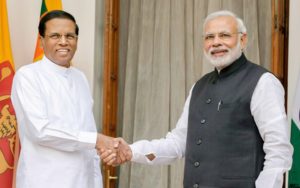
Sri Lanka has always been described as the Pearl of the Indian Ocean. It is never easy for a small island nation to remain a completely sovereign while being located just a few dozen miles off the coast of a behemoth-like country with 1 billion people. Thus, the power relations are distorted in all aspects. No wonder Sri Lankan scholars and journalists refer to India as “big brother.”
The cultural and religious affinities are present in a vibrant history of economic and social interactions. But concurrently Sri Lanka has also tried to remain independent from the politics and conflicts of India, ensuring that a unique identity was developed for the islanders. Sri Lankan Nationalism has been at the forefront of trying to protect that identity.
The long running relationship between the two countries has had quite a few hiccups. The latest has been over the furthering of the India-Sri Lanka Free Trade Agreement. It has been under negotiations since 2003 as the Comprehensive Economic Partnership Agreement (CEPA), now renamed the Economic and Technological Cooperation Agreement (ETCA).
From the very beginning the CEPA has been controversial in Sri Lanka. There has massive civil society protests against any government’s attempt to finalize the agreement. The current national unity government has also faced the same issue with ETCA.
Trade between the two countries is obviously one sided. In 2014, while Sri Lanka exported $700 million worth to India while India exported $3.1 billion worth to Sri Lanka. It is a massive trade gap for Sri Lanka, but it can do little about it. Indian products have a huge price advantage over Sri Lankan’s.
Ingrained in the memory of many middle aged Sri Lankans are the 1987 India-Sri Lanka Accords. The accords involved altering Sri Lanka’s constitution by adding the 13th amendment and introducing a large Indian Peacekeeping Force. To them, their motherland was once again invaded by Indians just 40 years after the British marched away. So now when the government says a new agreement could allow Indians to enter the workforce in the shipbuilding and IT industries, they see another invasion.
However it is worthwhile to take a brief look into the fledging Sri Lankan shipbuilding and IT industries. The shipbuilding is limited to basically two main operations. First is the Colombo Dockyard Company which is considered to be one of the leading dry-dock complexes in the South Asian region with a significant annual revenue. Second is the Sri Lankan Navy small vessel construction for its use in littoral waters. Expanding these operations in the short term will be tough due to the lack of skilled labor.
On the other hand the IT industry has been booming and expanding ever since the mid 2000s. Today,Sri Lanka has up to 80,000 IT professionals as a whole. Firms like WSO2, Millenium and Leapset/CAKE Labs are entrepreneurial, earning millions of dollars in revenues, with operations even in Silicon Valley.
However, entrepreneurs do confess that there is a dearth of skilled graduates for recruitment within Sri Lanka. The government wants to increase the IT export revenue five fold by 2020 requiring massive expansions.
Yet where the investments will come is an issue. The Sri Lankan IT industry resists opening up to foreign investors and labor, fearing that it could destroy budding local entrepreneurs. Nevertheless, Sri Lanka already has its own version of Uber, Pick me, Uber’s biggest local competition.
Liberal minded intellectuals and government politicians are calling the ETCA agreement a step forward to making Sri Lankan industries more competitive. Nationalists are calling it a threat to Sri Lanka’s sovereignty and identity.
However, Sri Lanka’s identity is already defined by a number of communities who have migrated to the island over the centuries. The Moors, Malay, South Indian estate workers, Gujarati and Chinese traders just to name a few.
Sri Lanka’s current fiscal status quo is starving for Foreign Direct Investments (FDI). The island state risks to lose its fiscal autonomy if it has to default on its debt servicing and falls under the thumb of the IMF. If properly utilized by the government, ETCA can be used to present Sri Lanka as having a liberal attitude toward trade and foreign investment.
Nationalism has played a decisive role in Sri Lanka ever since it became Asia’s first democracy in 1933. Politicians know exactly how to use it to serve their own interests. Nationalism of the Sinhalese majority turned chauvinism sparked the civil war and massive nationalization of private enterprises and property.
It drowned the country’s dreams of becoming the “Gateway to Asia” despite its geographic location. Today, government action towards recreating that dream is being opposed by nationalism once again. Some politicians are manipulating nationalism, claiming to be defending the sovereignty that Sri Lanka is not losing, only to return to power.